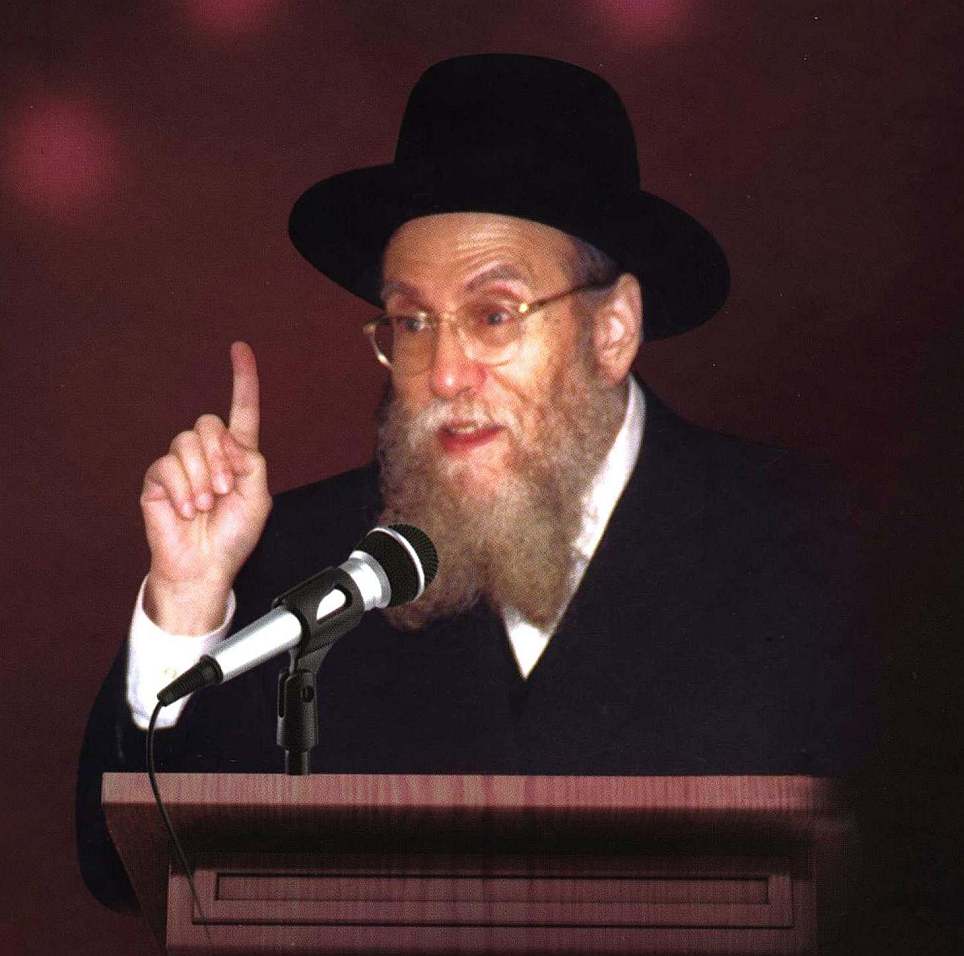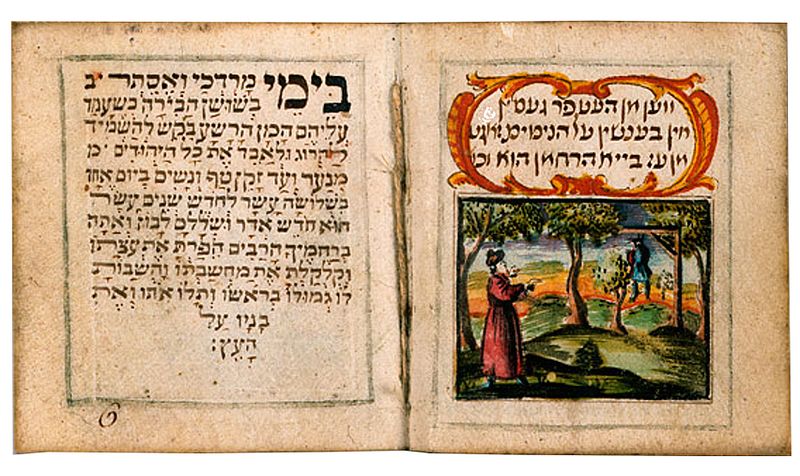| | NEWS
The Miracles of Purim
by HaRav Shlomo Brevda zt"l

In honor of Purim, we present these translations and excerpts from HaRav Brevda's world-famous shiurim on Purim, and his best-selling sefer on Megillas Esther and Purim — Kiymu Vekiblu — which was reprinted many times. They provide a deep insight into the underlying lessons of Purim. The material has been prepared specially for Yated, and some of it has never before appeared in print.
This was first published about 30 years ago.
For Part I of this series click here.
Part II
Klal Yisroel sinned but Hashem prepared the refuah considerably in advance of the naccoh that threatened them. The entire Megilla shows how seemingly unrelated events were eventually, as a result of HaKodosh Boruch Hu's eitza, used to save Klal Yisroel and to cause the downfall of their enemies.
The entire government of Achashverosh's vast empire was moved to Shushan because that was where Mordechai and Esther were. Two very difficult achievements were necessary for the atzas Hashem: Vashti must be out of the way, and Esther must be installed in her place. These were both quite impossible-looking goals.
However, Hashem was turning screws. Achashverosh was trying to live down his past as a stable boy, and held a big feast. Then he held another feast for the people of Shushan, at which he displayed himself as a "man of the people," (in order to aggrandize himself) by declaring that everyone could have whatever he wanted. His pride was rising to tremendous heights, at the same time that Vashti his queen was getting fed up with him. Hashem was clearly planning a clash.
Hashem arranged that Haman initiated a law that the king could kill anyone, even a minister, without consulting with a court. Achashverosh was maneuvered into killing Vashti, even though he did not want to do so. The first problem was solved.

The Solution of the Second Problem: Making Esther Queen
Problem number one has been solved. Vashti has been executed. The impossible has been accomplished through Atzas Hashem.
We face, however, a second problem, no less difficult than the first one. How do we get Esther to become the queen?
Achashverosh will never marry a Jewish woman, being an extreme antisemite. Add to this the fact that she was an old lady at the time. Who would marry an old Jewish lady? A king? Achashverosh? Despite this Hashem yisborach has determined that Esther shall soon be the Queen. And so shall it be! But how?
The posuk states, "The anger of the King subsided." What do these words reveal to us?
After the episode with Vashti, the King was apparently in a violent rage for some time. Achashverosh was a "great" man who had a "great" anger. During that period of anger, he was not fully aware of what was going on. The posuk says, "When his anger subsided, he remembered Vashti, and what she had done, and what was done to her." All this time he did not recall what had transpired. He was in a stupor of rage!
What happened when his anger subsided?
He suddenly reminded himself of Vashti, "Oh Vashti!" What should have been his concern at that moment? He should have been worried over the fact that, with Vashti's demise, his kingdom no longer had a "true royal" member. Vashti represented royalty, while he was a mere commoner.
Rashi, however, explains that he reminded himself of her beauty (not her royalty!) and he became depressed. Thus, Achashverosh went from anger into depression. How can one handle such a person? How can his condition be treated? Who will govern his vast empire, wisely and properly?
What did the King's advisers suggest to him, hoping to cheer him up?

"Proclaim a worldwide beauty contest," they said. "Gather all of the beautiful girls and women from all 127 countries. House them in the women's quarters of the royal palace, under the management of Heigai, the royal expert on women's cosmetics.
"And the maiden who shall be the most beautiful in the eyes of the King shall reign in place of Vashti." They did not refer to her as "Queen" Vashti, but rather, simply called her "Vashti." They were implying that her true importance was not her royal lineage — Queen Vashti — but rather, her beauty — Vashti. Consequently, her successor need only be beautiful.
The Megilla relates that those who advised him were "na'arei haMelech meshorsov." Who were they? The lads who served him, bathed and groomed him, the waiters, the butlers and the like.
Did Achashverosh not have more learned advisors? Being the ruler of the world, he most surely have had the best advisors. Why, then, are these simple lads giving him advice on a matter of such great importance?
This is my own explanation. Based on what the Gaon said previously, the answer is quite obvious. According to the "new" law, the King could punish and execute anyone, for whatever reason, without the need to ask a court for a judgment. For some time, the King was enraged, as previously stated. Consequently, no minister would come to him when he was in that state of mind. When his anger subsided, he went into a state of depression. Once again, no learned advisor would come to him while he was in a bad mood, especially with that new law.
Alas, who were forced to go into the King's chambers during that period? The waiters and the butlers, the janitors and the cleaners — they had to serve him. He could not be left to suffer from hunger and filth. On that day, when his anger subsided, these servants found the King lying in his chambers, in a deep depression, moaning over one thing only — Vashti and her beauty.

Beauty and Nothing Else
They said to the King, quite simply, "Finding a beautiful woman poses no problem. If you require a wife who has good middos, or one who speaks 20 languages, you have far to look. Someone of royal lineage is even more difficult to find. But women who can offer beauty are much easier to find."
If intelligent ministers had advised him at that time, they would have guided him to search for a woman of wisdom, intelligence, knowledge of languages, beauty, cheerful disposition, sociability, and — above all - Royal lineage. However, none of the ministers dared to appear before the King during that period, fearing for their lives. The new law (proposed by Haman) prevented any wise counsel from reaching the King.
Thus, the illiterate servants offered their "learned" advice, "Look only for beauty." Since no one else was present to advise otherwise, the King accepted the advice of his young servants and agreed that the only criteria in choosing his future queen would be beauty.
The posuk says, Esther did not divulge her nationality because Mordechai had so directed her. "We infer from these words, that everyone of these girls and women, the candidates to be the next queen, were indeed questioned about their ancestry and nationality. This seems to contradict our premise, that the only criteria for choosing the new queen was beauty and not lineage nor ancestry.
The explanation is quite simple. Despite the fact that Achashverosh had given orders to search for a woman of great beauty and nothing else, the government officials and bureaucrats used some of their own discretion in carrying out his command. They added sophistication to this exercise, by asking numerous questions of all the candidates, pertaining to lineage, nationality etc. However, in view of the King's expressed directive to disregard all other considerations, and concentrate upon one criteria, namely "beauty," the replies to all questions were optional!
Thus, if a maiden did not answer any of these questions, or even all of them, no harm was done to her candidacy. The King desired a queen of great beauty and nothing else really mattered.
We can safely assume that the vast majority of these women, if not all of them, eagerly responded to all of these questions, hoping to find favor in the eyes of the officials. However, Esther refused to answer any query pertaining to her nationality, as previously mentioned. Normally, such an action would have been considered an affront to the kingdom, probably warranting an appropriate punishment. At the least, it would have disqualified her from ever being chosen as queen.
However, Achashverosh, acting upon the "learned" advice of his young housekeepers — "na'arei haMelech meshorsov" — had decreed that only the woman's beauty shall determine her standing, all the rest being of no significance, and therefore having no bearing upon her candidacy.
Thus, a miracle of miracles transpired. A world monarch, ruler of 127 countries, agreed to take as his wife and queen a woman about whose background lineage, ancestry, nationality and religion, he knew nothing at all. Alas, the virulent antisemite Achashverosh, took an elderly ultra Orthodox Jewish woman to be his queen! Atzas Hashem had triumphed once again!
The refuah was prepared well in advance of the naccoh. Esther, as queen, was in position to do her part in yeshu'as Yisroel, long before Haman came out with his gezeira.
Rabbeinu Yechezkel zt'l (the mashgiach of Mir and Ponovezh) points out the irony of the situation: Achashverosh, who had just recently sent a royal decree to all of his subjects, stating that every man shall be the ruler in his household, is now living with a wife and queen who, despite his numerous requests, refuses to divulge her nationality to him! What a great ruler!

PurimMe'ah_BerachotReprint.jpg
Atzas Hashem has Triumphed
Indeed, Atzas Hashem has caused Haman to propose a law giving the king the power to punish without a trial. Atzas Hashem has caused the ministers to adopt this law (which places their lives in peril!). This law brought about the death of Vashti, prevented the ministers from giving wise counsel to the King (in fear of his anger), and caused his new advisors to be nothing more than his young, illiterate housekeepers. Their advice, in turn, enabled Esther, a Jewish woman, to become queen, in order to do her part in the yeshu'oh from the gezeira of Haman.
Much later on, in the Megilla, the young servants, "na'arei haMelech meshorsov," appear once again. Having successfully accomplished the miraculous feat of enabling Esther to become the new queen, these devoted young lads resurface at a very crucial moment. Hashem yisborach has commissioned their services, once more, for a project which required their (lack of) "expertise."
Achashverosh awakened in the middle of the night after a nightmarish dream. He was quite confused and concerned. On the previous day, Esther suddenly appeared, inviting both himself and Haman to a private mishteh. She said that she had a special request to make. However, she chose to remain silent, inviting them to a second mishteh on the next day. Achashverosh suspected that something was brewing unknown to him. He felt quite isolated. Why had no loyal subject come forward to reveal to him the secret intrigues that were transpiring around him?
He began to think. Had anyone, in the past, revealed to him an intrigue or a plot against him? Had he given that loyal informer an appropriate honor and reward?
He ordered that the royal diaries be brought and read aloud. Alas, it was discovered that Mordechai haYehudi had once revealed a plot to poison the King, thus saving the King's life.
"What has been done to honor and reward Mordechai for this?" he asked aloud.
Since this episode took place in the middle of the night, no minister was present to reply to his question. There must, however, be someone available to serve the King at all hours. A royal monarch is never left unattended. Indeed, despite the fact that Shushan's population was fast asleep at that pre-dawn hour, Achashverosh was surrounded with his obedient servants. The night shift — of the devoted young lads — "na'arei haMelech meshorsov" — were all present and accounted for!
The Talmud reveals to us that these young servants, being goyim, had no love for Mordechai haYehudi. Nevertheless, they utterly despised his enemy — Haman. No reason is given to explain this hatred.
Perhaps we may suggest the following. Achashverosh had issued a decree obligating all of the royal servants to kneel and bow down to Haman whenever he strutted about the royal courtyard. Haman, whose desire for honor and glorification was endless and constant, probably made a habit of marching through the courtyard countless times during the day. The poor servants, hard at work, were constantly forced to kneel and bow down to him, over and over again. With time, they all probably developed bruised knees and aching backs, to say nothing of frustrated egos! This may have caused them to despise him. Hatred breeds a desire to take revenge.
Back to the story. The deep animosity between Haman and Mordechai was well known to all of the ministers and servants of the royal palace. We can assume that during the era of Haman's power, all ministers and high government officials were Haman's appointees and his devoted followers and well-wishers — and Mordechai's enemies. Who, therefore, would have imagined that, within the palace walls, there was a tightly-knit group of individuals who despised Haman, and longed to see his downfall?
But there where the "na'arei haMelech meshorsov" — those devoted young lads, who had, on a previous occasion, been the pawns of Hashem yisborach in a miraculous event.
If any minister, or government official, would have been present when Achashverosh inquired — "What was done to reward Mordechai?" — he would, undoubtedly, have replied, "Your Majesty, you may rest assured that Mordechai was adequately rewarded. However, at this hour all government ministries are closed and the records are locked away. At daybreak, the record of Mordechai's reward shall be delivered to Your Highness." The officials would then have proceeded to falsify the records, in order to prevent Mordechai from receiving a reward from the King.
However, Hashem yisborach had created a situation where no minister or official was present. It, therefore, remained for "na'arei haMelech meshorsov" to reply to the King's question. Realizing that a reward for Mordechai would be an agonizing blow to Haman (whom they despised), the young servants vigorously responded, "lo na'asseh imo dovor" — nothing at all was done to reward Mordechai!
The King immediately inquired, "Who is present in the courtyard?"
The Gaon explains that Achashverosh desired to bestow upon Mordechai an honor and a reward which would be considered generous and appropriate in everyone's eyes. He, therefore, inquired — "Is there an important official present in the courtyard?" — intending to ask that learned, experienced official for his opinion on an appropriate reward. He was not going to seek the advice of his illiterate servants on this matter. In their humble estimate, a proper reward might be a sophisticated broom!
Once before, he took their advice on how to choose a new queen. Even then, he did not seek their advice. Rather they, on their own initiative, offered their advice to him. He, in turn, accepted their advice, being in a state of depression, without proper judgment. In the present situation he was not depressed, but rather distressed, and quite capable of rational judgment. He wisely sought the counsel of an intelligent minister.
At that moment, before daybreak, Haman entered the courtyard. He had come at such an early hour in order to be the first minister to speak with the King that morning. He was going to use his great persuasive talents to influence the King to order the hanging of Mordechai on the tall gallows that he had erected during the night. Haman was full of vigor and self-confidence.
The young servants, peering into the courtyard, noticed the arrival of Haman. The King had inquired if any minister was present in the courtyard. Any government official who would have been present on that occasion, would have certainly whispered to Haman the following: "Haman, the King is presently discussing a royal honor and reward for Mordechai. This hour is not particularly opportune for your appearance before the King. Get out of here! Run and hide!"
However, the only ones present at the time were the young servants — those devoted lads who despised Haman. Their moment of revenge had arrived. They gleefully announced to the King, "Look! Haman is in the courtyard!"
"Have him come in!" exclaimed the King. Indeed, have Haman come in — to face a day of astonishment, mental agony, abuse, degradation, sorrow, and finally, hanging from the very gallows which he erected! Once again, "na'arei haMelech meshorsov" had been the pawns of Hashem yisborach in a miraculous event, on behalf of yeshu'as Yisroel.
Conclusion
The number of episodes which I have attempted to explain, herein, are a very small portion of Megillas Esther. Indeed, the Megilla contains many more actions and occurrences, which are startling and astonishing, given the proper explanation. The readers should be advised that — "You have hardly heard anything as of yet!"
Let us conclude (for this year) with the following important observations. The numerous miracles of Megillas Esther were all nissim nistorim, concealed miracles.
These concealed miracles should be divided into two distinct categories. The first few chapters of the Megilla relate the miracles which Hashem yisborach performed for Klal Yisroel, years before the gezeira of Haman was issued. At that time, the Yidden were not fasting, praying or doing teshuva in any special way. The miracles of that period were pure expressions of endless devotion and concern on the part of Hashem yisborach towards the Jewish people. This was the period of "Borei refuah kodem lamaccoh," as explained herein.
The later chapters of the Megilla deal with the situation once the gezeira was decreed. To annul this gezeira, Mordechai and Esther guided Klal Yisroel to pray, fervently, to Hashem yisborach, to fast and do teshuva, over and over again. The immediate response by Hashem yisborach took the form of additional concealed miracles, including the appearance of mal'ochim, angels, at very crucial moments. The heartfelt prayers of the Yidden brought new life to these miracles, teaching us how eager Hashem yisborach is to respond to our prayers.
The rishonim teach us, that many months after Haman was hanged, when the 13th of Adar arrived, the Yidden gathered together, in every city and town, for fasting and praying. No goy dared attack them. They then succeeded in destroying 75,500 reshoim on that day.
Purim should cause every Jew and Jewess to have a much greater appreciation of tefillah, prayer to Hashem, and to do so with added concentration and fervor.
|




